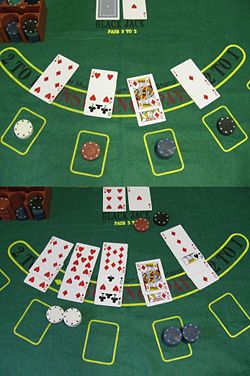
Back بلاك جاك Arabic Blackjack AST Blackjack BAR Блэкджэк Byelorussian Блэкджэк BE-X-OLD Блекджек Bulgarian Blackjack BS Blackjack Catalan Blackjack Czech Blackjack Danish


Blackjack (Twenty-one, pontoon or Vingt-et-un) is a kind of card game which usually involves gambling. It is often played in casinos. There is a dealer, who deals cards from a special device called a 'dealer's shoe' or a 'shuffling machine'. The dealer has one to eight decks. When there are one or two decks, the dealer usually holds the decks instead of dealing from a shoe.
It is a 'dealer versus players game'. Each player has their own game against the dealer. Cards are dealt in succession, and bets placed for each hand. Players win if their cards add up to more than the dealer's hand to a limit of 21. Hands which add up to more than 21, called busted hands, lose. Face cards count as 10. Aces can count as one or eleven.
'Blackjack', an ace and a face card or ten, is the top scorer. Blackjack usually pays a bonus. Five cards adding to 21 or fewer is the next ranking hand. Apart from that, unbusted hands rank by total add-up. Hands below the dealer's hand lose unless the dealer goes over 21 (busts). Hands equal to the dealer's keep their chips. If both the player and dealer bust, the dealer wins.
Players have a choice whether or not to get extra cards. Stand means to get no more cards and hit means to ask for another card. To stand, wave your hand back and forth. To ask for another card, wave your hand toward you. You can ask for any number of cards unless you bust. The dealer has rules as to when he takes extra cards for himself (or herself). In the UK, the dealer must stand on 16.[1] These rules are set by the casino and cannot change after the game has started. In some states or countries, the rules are set by the government.[2][3]
There is some skill in blackjack, because the odds change as the cards are dealt. The critical information is the numbers of tens (including face cards) which have been dealt. This is because they are the common cause of 'busting' the dealer hand and because they are needed for a blackjack. Aces are also important because they are needed for a blackjack.[4] Keeping track of the cards is called 'card counting'. It is legal if done without a device like a computer. But, many casinos tell players to leave if they think are counting the cards.
- ↑ UK regulations
- ↑ Rose, Nelson I. and Robert A. Loeb 1998. Blackjack and the law. ISBN 0-910575-08-8
- ↑ Humble, Lance and Carl Cooper 1980. The world's greatest Blackjack book. ISBN 978-0385153829
- ↑ Thorp, Edward O. 1966. Beat the dealer: a winning strategy for the game of Twenty-One. Vintage. ISBN 978-0-394-70310-7